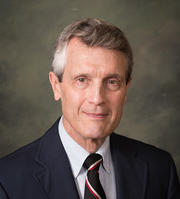Roger Howe
William Kenan Jr. Professor of Mathematics
 Roger Howe, B.A. Harvard University, Ph.D. University of California at Berkeley, faculty member at Yale since 1974: Ever since you won the prestigious William L. Putnam competition as a Harvard undergraduate—a feat that distinguishes young mathematicians as the most promising of the next generation – your brilliance has been recognized. Since that time your youthful promise has been borne out: You have made many critical contributions to a variety of branches of pure mathematics and your work has been lauded for both breadth of understanding and creative insight. Many of your papers are breakthroughs in the subject of number theory, “the jewel on the crown of mathematics,” a field which from the mid twentieth century to the current moment has grown enormously and has come to incorporate ideas from geometry, algebra and topology.
Roger Howe, B.A. Harvard University, Ph.D. University of California at Berkeley, faculty member at Yale since 1974: Ever since you won the prestigious William L. Putnam competition as a Harvard undergraduate—a feat that distinguishes young mathematicians as the most promising of the next generation – your brilliance has been recognized. Since that time your youthful promise has been borne out: You have made many critical contributions to a variety of branches of pure mathematics and your work has been lauded for both breadth of understanding and creative insight. Many of your papers are breakthroughs in the subject of number theory, “the jewel on the crown of mathematics,” a field which from the mid twentieth century to the current moment has grown enormously and has come to incorporate ideas from geometry, algebra and topology.
More specifically, you are well known among mathematicians around the globe for your pathbreaking contributions to mathematical representation theory, to which the names “Howe Pair,” “Howe correspondence,” and Howe-Moore theorem bear testimony. For these accomplishments you have been elected to the National Academy, and you are a highly desired speaker around the world. A willing traveler, you have held positions of honor from the Institute for Advanced Study at Princeton to Bonn, Oxford, Rutgers, Sydney, New South Wales, Paris VII, Basel, Kyoto and many more. You have a particularly strong research group of former students at NUS in Singapore where your mathematical legacy is strong and mere mention of acquaintance of you by a Yalie causes a warm reception by the faculty.
For all your great work in theory, You are not easy to categorize: You are an analyst and algebraist who loves geometry, thinks in terms of pictures and sees himself as a geometer. You are a pure mathematician, but one who has always felt a pull between the abstract and the practical. Perhaps this is part of why you have been such a marvelous teacher at all levels. From your 21 doctoral students who over the years have gone on to distinguished careers of their own, to the elementary school teachers who have learned from your outreach activities, many at all levels have benefited from your pedagogic gifts. You have served selflessly and tirelessly on national and international committees for the advancement of mathematics and for the improvement of mathematics teaching, taken a stint as Phi Beta Kappa Visiting Scholar around the country, and were awarded the 2006 American Society Award for Distinguished Public service in Mathematics. What other distinguished pure mathematician does anyone know who has written an article entitled “Three Pillars of First Grade Mathematics”?
But your intellectual and pedagogical attributes are not all. At Yale you think deeply about the interests of your department, its students, and the university, and your wisdom and guidance are highly valued. Your colleagues can recall times when disagreement or trouble has arisen, and everyone has looked to you for perspective and counsel. And you are thoughtful in the personal sense of the term, in the way you graciously consider the feelings of others and pay attention to the changes in their lives: one of the unforgettable gifts you have given inclusively to all in the Mathematics department—faculty and staff alike—has been a postcard addressed individually (not just to the department) from everywhere you have traveled. You are a distinguished mathematician, yes – but you are also highly regarded as a kind and thoughtful man. As you retire your colleagues hope you will always be in the department when you are not sending postcards from somewhere else. The University regards itself lucky indeed to have a Harvard man who has become such a Yale Worthy.
Tribute Editor: Penelope Laurans